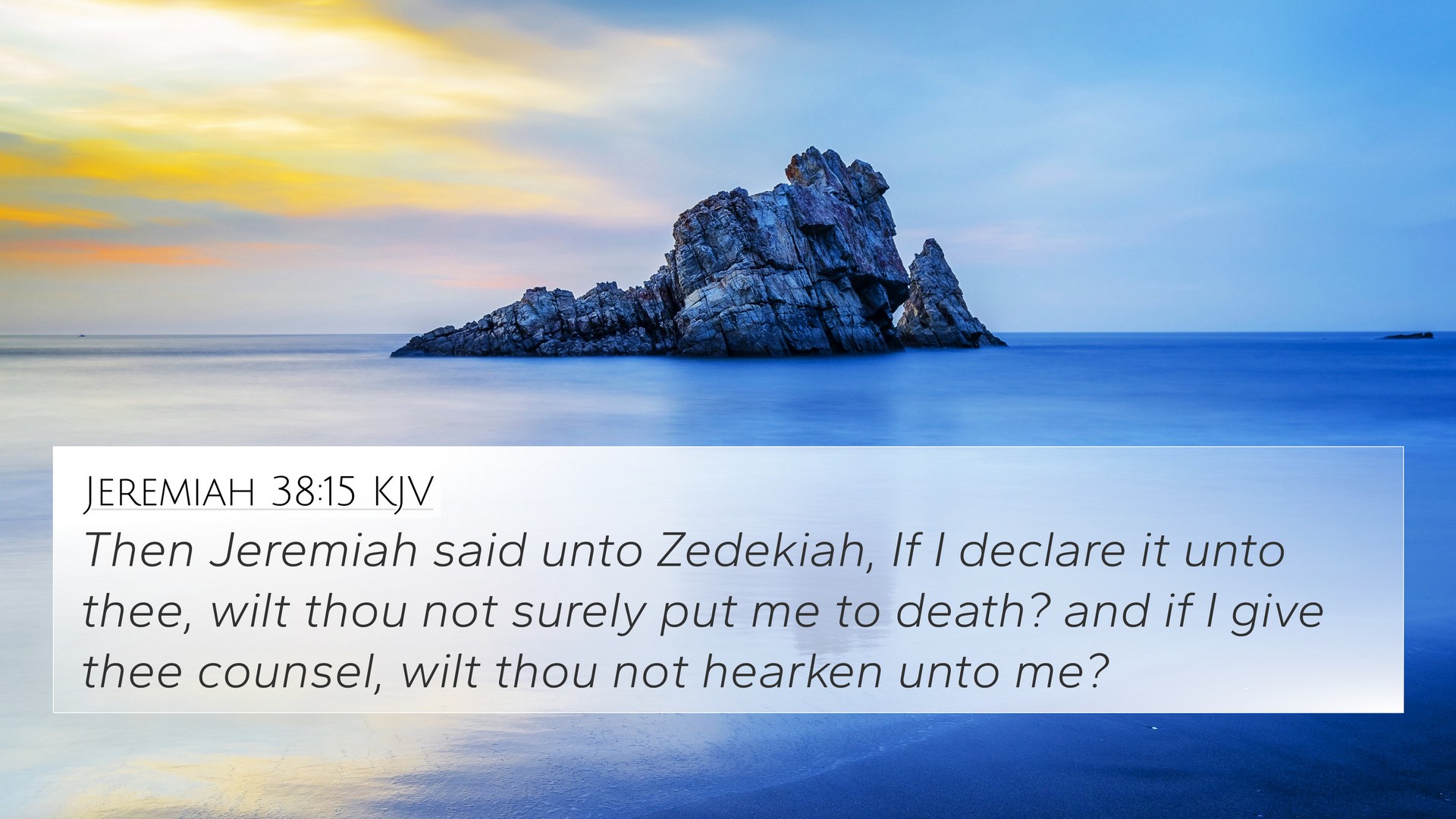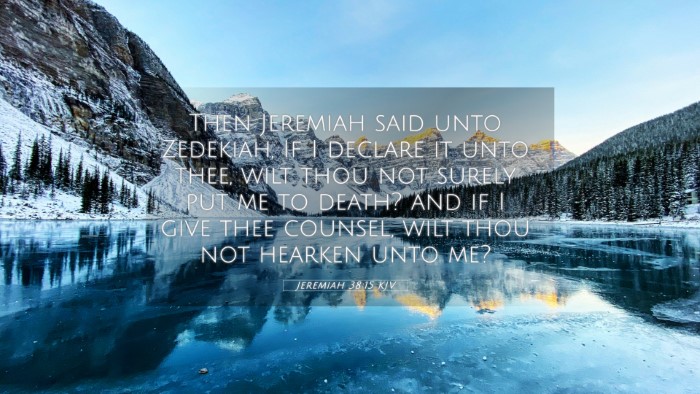Understanding Jeremiah 38:15
Verse: "Then Jeremiah said unto Zedekiah, If I declare it unto thee, wilt thou not surely put me to death? and if I give thee counsel, wilt thou not hearken unto me?" - Jeremiah 38:15 (KJV)
Overall Meaning
Jeremiah 38:15 captures a critical moment in the dialogue between the Prophet Jeremiah and King Zedekiah. This verse reflects Jeremiah's awareness of the grave risks he faced in advising the king, considering the political turmoil in Jerusalem and the impending Babylonian siege. His caution reveals a profound insight into the relationship between a prophet and a ruler, emphasizing the challenges prophets often encounter when conveying God’s messages to those in power.
Insights from Commentaries
Matthew Henry’s Commentary
Matthew Henry highlights the perilous position of Jeremiah as a prophet, struck by the dual threat of being persecuted for speaking the truth. He notes that Jeremiah exhibits profound wisdom by inquiring whether Zedekiah would heed his counsel, thereby indirectly acknowledging that the king's reaction could determine his fate. Henry points out that this illustrates how divine truths can often meet resistance when presented to those unwilling to hear.
Albert Barnes’ Notes on the Bible
Albert Barnes underscores the significance of Jeremiah's response as revealing both fear and resolve. He notes that Jeremiah needs to consider whether his counsel would be accepted or lead to his demise. This dilemma reflects a broader theme in the prophetic tradition, where delivering God’s word often brings personal danger. Barnes suggests that this encapsulates the struggle of faithfulness in a politically hostile environment.
Adam Clarke’s Commentary
Adam Clarke provides a deeper exploration into the social and political backdrop of Jeremiah's statement. He emphasizes Jeremiah’s role not only as a prophet but as a man entangled in the machinations of court politics. Clarke notes that the king's potential response could not only threaten Jeremiah but also reflect the state of the nation’s spiritual condition. His commentary reflects on the broader implications of free will in receiving divine counsel and the consequences of rejecting such guidance.
Thematic Connections
This verse notably participates in several overarching biblical themes, including:
- Prophecy and Persecution: Jeremiah's concern about the reception of his message highlights the common theme of prophets suffering for truth across scripture.
- Kingdoms and Spiritual Counsel: The dialogue between the prophet and the king underscores the importance of seeking divine wisdom in leadership, themed throughout both Old and New Testaments.
- Faithfulness in Adversity: Jeremiah’s position mirrors other scriptural figures who faced threats while remaining faithful to their divine calling.
Bible Cross-References
Jeremiah 38:15 relates to several other passages that illuminate its themes:
- Jeremiah 20:2: Another instance of Jeremiah facing persecution for his prophecies.
- 1 Kings 22:24-25: Micaiah's similar experience with King Ahab illustrates a prophetic voice faced with the threats of monarchial power.
- Ezekiel 3:17: Discusses the responsibilities of a watchman and the consequences of failure to warn.
- Matthew 10:28: Jesus advises not to fear those who kill the body, but rather to fear God, aligning with Jeremiah's hesitation.
- Acts 4:19-20: The apostles' determination to speak God's word reflects Jeremiah's predicament.
- Luke 4:24: Jesus mentions that no prophet is accepted in his hometown, echoing Jeremiah’s struggles.
- Hebrews 11:36-38: A recapitulation of the sufferings endured by prophets, aligning with Jeremiah's experiences.
Connections Between Bible Verses
The dialogue in Jeremiah 38:15 not only stands as a testament to Jeremiah's life but also weaves into several inter-Biblical dialogues:
- Comparison with the trials faced by Elijah highlights the theme of divine counsel against royal defiance.
- Connections to Jonah's reluctance to deliver God's message and the subsequent consequences emphasize the weight of prophetic responsibility.
- The interplay between Jeremiah and Zedekiah is reminiscent of Pilate’s dealings with Christ, where truth is endangered by political expedience.
Tools for Bible Cross-Referencing
For those wishing to explore further, several tools and methods are useful for cross-referencing Bible verses:
- Bible Concordance: Provides alphabetical lists of biblical words along with their occurrences.
- Bible Cross-Reference Guide: Maps connections between verses based on themes and stories.
- Cross-Reference Bible Study: Enhances understanding by studying related passages side by side.
- Bible Reference Resources: Various study guides and tools that facilitate deeper exploration of scripture.
Conclusion
Jeremiah 38:15 serves as a powerful reminder of the complexities of divine communication within the realms of earthly authority. Highlighting prudent wisdom, the perils of prophetic ministry, and the essential ask for obedience to God's counsel, this verse resonates throughout both the Old and New Testaments. Understanding this verse opens up numerous pathways for deeper scriptural connections and thematic discussions in biblical studies.



